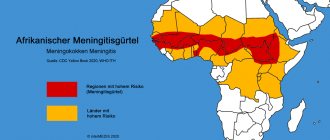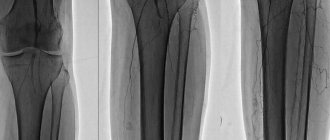Measles is rightfully considered one of the most dangerous and widespread infectious diseases. Since the main risk zone is for preschoolers, it is often called the “children’s zone.” However, the risk of infection remains at any age. Measles is transmitted very simply: by airborne droplets. Symptoms begin to appear within two weeks.
For more than half a century, this disease has been fought through mass vaccination of the population. Unfortunately, recently more and more parents prefer to trust myths and dubious theories rather than proven scientific facts. Because of this, more and more outbreaks of this disease occur from time to time.
You need to understand that the measles vaccination in adulthood must be done regularly. This is especially important for women planning pregnancy and people with chronic pathologies.
If you're still unsure, it's important to understand how the vaccine works. The weakened virus is introduced into the body by injection. It is not capable of causing illness, but it “teaches” the immune system to cope with the threat. Immediately, antibodies begin to be produced that fight the virus and “remember” its characteristics. In the future, it will be easier to defeat a more dangerous and concentrated virus.
Vaccine options
Measles vaccine is often combined with rubella and/or mumps vaccines in countries where these diseases are a problem.
It is equally effective both as a single vaccine and as a combination drug. Combining vaccines against measles and rubella only slightly increases its final cost and makes it possible to combine the costs of vaccine delivery and vaccination. In Russia, the live measles cultural vaccine, the mumps-measles cultural live vaccine (Divaccina), the trivalent vaccine "Priorix" (live), the trivalent vaccine "M-M-R II MMR-II (live)" are used. Measles vaccine is weakly reactogenic. A vaccinated person is not contagious to others. After double immunization, the protective antibody titer is determined in 95-98% of vaccinated people, immunity lasts up to 25 years. The main difference between imported vaccines and domestic ones is the presence of trace concentrations of chicken egg protein, since it is in chicken embryo cell culture that the measles virus is cultivated to make the vaccine. The Russian measles vaccine is prepared by cultivating an attenuated strain of measles virus on a primary cell culture of quail embryos. The domestic vaccine meets WHO requirements and is superior to the Belgian and American ones in terms of a lower percentage of vaccine reactions, absence of rash and temperature rise above 38.50 C.
Are there any restrictions
Despite the fact that vaccination is mandatory for everyone, there are a number of contraindications for medical reasons.
You cannot vaccinate if you have the following restrictions:
- allergies to aminoglycosides or any other component of the vaccine, for example, egg white (some imported drugs);
- diagnosed oncology;
- poorly tolerated previous vaccination;
- acute respiratory infections;
- taking immunosuppressive medications;
- immunodeficiency (primary or secondary);
- During pregnancy and breastfeeding;
- serious illnesses.
In these cases, vaccination is not possible due to the fact that the potential harm from it outweighs the benefits. If there are contraindications, then the person takes a medical exemption from vaccination. If the patient is sick (for example, with a cold), then you need to postpone the date of vaccination and wait until he recovers.
Principles and purposes of vaccination
Vaccination against measles has the following positive properties - it prevents epidemics of infection, reduces mortality and disability, and also helps limit the circulation of the virus in the population. Because measles is one of the leading causes of death among young children, the main goal of measles vaccination is to prevent the spread of this disease throughout the world.
By the end of 2014, 85% of the world's children under two years of age had received one dose of measles vaccine, and 148 countries included a second dose as part of their routine immunization programs. Immunization against measles is recommended for all susceptible children and adults for whom it is not contraindicated. This vaccine should be used to prevent outbreaks; large-scale vaccination to control existing outbreaks has limited effect.
How many times are adults vaccinated against measles?
Since the world is currently experiencing a difficult epidemiological situation, doctors strongly recommend that adults also get vaccinated. In addition, sometimes you need a certificate of vaccination to travel.
Adults are usually vaccinated against measles twice. Between them should pass from one to three months. Research shows that these vaccinations are sufficient to obtain complete immunity from this infectious disease.
After vaccination, it is advisable not to drink alcohol for at least several days, because the immune system is already weakened. You should also avoid swimming in bodies of water with unreliable water. You can shower without risk to your health.
Vaccine effectiveness
In 2014, about 85% of all children worldwide received one dose of measles vaccine within the first year of life (up from 73% in 2000). Accelerated immunization efforts have had a significant impact on reducing measles deaths. In 2000-2014 Measles vaccination prevented an estimated 17.1 million deaths. Global measles deaths have dropped by 75%, making the disease's vaccine one of the most beneficial public health advances.
Vaccination also effectively prevents the risk of dangerous complications. For example, a complication such as encephalitis occurs in 1 case out of a thousand sick people and 1 case out of 100,000 vaccinated people. The risk of developing a serious complication in the case of measles vaccination is 100 times less than with a full-fledged disease. The measles vaccination provides a person with immunity for a fairly long period of time - on average 20-25 years.
Today, research has revealed active immunity against measles in people vaccinated up to 36 years ago. Why give a booster vaccination against measles to a 6-year-old child, when only 5 years have passed since the first vaccination?
This need is due to the fact that approximately 15% of those vaccinated do not develop immunity 1 year after the first dose, and children remain unprotected. Therefore, the second vaccination is aimed at ensuring that children who have not developed immunity at all (or have a weakened one) can receive reliable protection against infection before starting school.
Many experts consider prevention to be the best way to treat any disease. Sometimes it is precisely this wall that protects children from many infections. Vaccination against measles is the only way to guarantee a person’s protection against this dangerous disease. Thanks to immunization, the morbidity rate in children and adults was reduced to 85%.
Measles, all about the disease
Measles has become a fairly rare disease in children over one year of age due to regular immunization. This infection is dangerous for humans.
Let us note the most important features of this disease:
- When infected, the child's temperature rises significantly. It can reach more than 40 degrees C.
- The disease is accompanied by symptoms similar to a cold (runny nose, dry cough, sneezing, sore throat). Specific manifestations are also observed in children, which include: hoarseness, photophobia, swelling of the eyelids, rashes on the body.
- Infection of nearby people can occur up to 4 days of illness.
- The development of the disease causes a sharp decrease in immunity in children. A number of bacterial complications can occur during infection.
- After the mother suffers the disease, the child’s body will acquire immunity to the virus within 3 months, no more.
- Measles is difficult for young children (under 5 years of age). One of the dangerous complications is death.
In 2011, the disease killed more than 100,000 children worldwide who were not vaccinated against measles.
The spread of the virus occurs through airborne droplets.
A person with measles is contagious even during the incubation period. The causative agent of the infection in question is unstable in the external environment; it dies after exposure to physical and mechanical factors.
The importance of measles vaccination, vaccination schedule
Experts consider vaccination to be the only effective method of preventing infectious diseases. It does not need to be done if a person has contraindications.
The first measles vaccine should be given between 12 and 15 months of age. Vaccination should be done at an early age because adults are more susceptible to vaccination than children.
The measles vaccine is sometimes combined with many other vaccines. Vaccinations against measles, mumps, and rubella are often given at the same time.
According to the plan, 2 measles vaccinations should be given. We indicated the timing of the first vaccination above, and the second should be performed at the age of 6 years (provided there are no contraindications). Typically, the time for revaccination occurs during the Mantoux test. Experts recommend conducting a test before measles vaccination, or after some time has passed (after 1.5 months). At the same time, these vaccinations are given only if there are emergency indications in a child over one year old.
The routine vaccine is administered to children twice (12–15 months, 6 years). In rare cases, you need to deviate from this vaccination schedule:
- If one of the family members is infected, everyone under the age of 40 must be vaccinated. The exception is children under one year old.
- When a child is born from a mother in whose blood no antibodies to the virus are detected, the baby is vaccinated in the first 8 months of life. Then the child is vaccinated according to plan (14 – 15 months, 6 years).
Parents, and even children themselves, are interested in the question: where do they get vaccinated against measles? 0.5 ml. The drug is administered to a child or an adult in the following areas:
- under the shoulder blade;
- outer shoulder area.
Preparing for the injection
No special preparation is required for vaccination:
— The measles vaccination can only be given to healthy children (adults). There should be no signs of ARVI.
— Before administering the drug, it is recommended to undergo a full examination by a doctor and take tests.
There are also rules for behavior after vaccination. They are as follows:
— While taking a shower, you should not rub the area where the drug was injected.
- Avoid visiting crowded places for three days.
— New products should not be introduced into the child’s menu.
Measles vaccine for adults
If an adult decides to get vaccinated, he is recommended to undergo tests to detect antibodies to the infection. A person can have a latent form of measles without even knowing it. In this case, experts say that vaccination is not necessary.
Once the height of the epidemic has been confirmed, vaccinations cannot be done. If a person does not have a first vaccination, he should be vaccinated before traveling to a dangerous region (no later than 2 weeks before departure). The most cases of infection with the virus have been recorded in France, Germany, Great Britain, Romania, Italy, Denmark, Uzbekistan, and Spain.
The measles vaccine is given only for a certain period. Repeated administration of the drug is necessary after 3–5 years. The time for repeated vaccination in adults depends on the characteristics of the body and the vaccination schedule in the country.
Adults are vaccinated against measles up to 35 years of age, twice with a 3-month break between vaccinations. Revaccination is not needed. The body will remain immune to infection for more than 12 years. For adults, the drug is injected into the shoulder (upper third).
This infectious disease is dangerous due to complications.
Among the most severe complications we list:
- encephalitis;
- pneumonia;
- otitis;
- meningoencephalitis;
- pyelonephritis;
- sinusitis;
- hepatitis;
- meningitis;
- Eustachitis.
What vaccines are used?
The measles vaccine contains live or weakened viruses. In this state, they are unable to cause illness in the child, but only help to develop the body’s immunity to infection.
Features of the measles vaccine:
- Thermal lability. The vaccine loses its properties when exposed to conditions with an uncomfortable temperature. Its storage should be carried out at temperatures up to 40C, not higher. High/low temperatures provoke rapid destruction of the drug.
- If any unused vaccine remains, it should be destroyed.
- The drug should be administered with caution to people allergic to the antibiotic or egg white.
For preventive purposes, single vaccines and combination vaccines can be used (they also protect against rubella and mumps).
Vaccines used:
- "Ruwax." Made in France.
- LCV (monovaccine).
- Mumps-measles vaccine (Russia).
- Priorix (UK).
- MMR (combined measles, rubella, mumps). Made in USA.
How to choose a measles vaccine?
The issue is quite complex; to solve it, consultation with a specialist is necessary. The doctor will be able to choose the best option by assessing the tolerability of a particular drug.
Even after vaccination, a child can get measles. The disease can develop when a child’s immunity has sharply decreased after a single vaccination. But if a child over one year of age becomes infected, the infection will be much easier to bear. Vaccination in this case helps to stop the development of the disease, prevent its severe course, and reduce the risk of complications. Reaction to vaccination
Immunoprophylaxis is carried out using a weak live vaccine. It is very important to know whether and what consequences can occur after measles vaccination.
The measles vaccine can provoke 2 types of reactions:
- general (redness of the pharynx, mild cough, flushing, runny nose, conjunctivitis);
- local (redness in the area of vaccine administration, swelling). These manifestations disappear after a few days.
In some cases, the temperature may rise (after 6 days). The child may experience nosebleeds, decreased appetite, a measles-like rash, and malaise.
The reaction to the measles vaccine varies depending on the severity of the symptoms:
Weak. The temperature increase is only 10C. The symptoms of intoxication that we discussed above are not observed. Average. The temperature rises within 37.6 - 38.50C. There are mild symptoms of intoxication. Strong. The child has a very high temperature, weakness (for a short time), rash, cough, redness of the throat.
The above symptoms may occur when a single vaccine is administered (immunity against measles only). If combined vaccinations are carried out (rubella, mumps), additional symptoms may appear (inflammation of the salivary glands, joint pain).
Possible complications
Parents are concerned about how the measles vaccine is tolerated. Can post-vaccination complications occur? In medical practice, cases of severe complications have been recorded (very few). Usually the cause of complications lies in:
- violation of vaccination technique;
- failure to comply with contraindications;
- individual intolerance to the components of the drug;
- poor quality vaccine.
The following side effects may occur after vaccination:
- convulsive reaction. Convulsions occur at elevated temperatures. According to experts, this complication is not severe;
- toxic reaction. It appears only 6–11 days after vaccination. Characteristic: intoxication, high fever, measles-like rash, sore throat. These signs are observed for 5 days, no more;
- post-vaccination encephalitis. Nausea, agitation, headache, confusion, and convulsions may occur;
- rash. It may indicate the development of an allergic reaction. And joint pain and Quincke's edema may also occur;
- bacterial complications;
- exacerbation of allergic diseases.
Contraindications to vaccination for children and adults
Vaccination against measles will help avoid the dangerous consequences of the disease. But there are contraindications. In some cases, a child (adult) cannot be vaccinated against measles either at 12 months or again at the age of 6 years:
- pregnancy;
- primary immunodeficiency;
- the presence of severe complications from a previous vaccination;
- presence of allergies to aminoglycosides, chicken protein;
- neoplasm (malignant);
- vaccination is postponed for 3 months in case of administration of immunoglobulin and blood products;
- acquired immunodeficiency (AIDS). Vaccination is contraindicated in the development of its severe form. If there are no clinical manifestations of HIV infection, the administration of a live vaccine is allowed.
Documentation Features
All vaccinations are carried out only with the consent of the parents. Vaccinations performed must be documented. Measles vaccination also falls under this rule.
How does the vaccination process take place?
Initially, the pediatrician examines the child. Before the drug is administered, parents are given a form to sign indicating that they consent to this medical procedure.
If parents are against vaccination, they are required to issue a written refusal to the procedure. The signature of one of them is enough. The refusal must be drawn up in two copies. The doctor pastes the first copy into the child’s card, copy No. 2 should be attached to the local journal “On immunization of the population.” Parents file an annual waiver of vaccination.
Preventing measles
Measles vaccination is considered the only preventive measure.
The weakened virus is not dangerous to health; it will help the body develop immunity to the disease.
Sometimes emergency prevention is needed. It consists of vaccination within 2–3 days after a child (over 6 months of age) comes into contact with a sick person.
For young children under one year old (aged 3–6 months), emergency prevention involves the administration of human immunoglobulin. It contains protective antibodies from the serum of donors and people who have had measles. After 2–3 months, active immunization can be done.
Source: https://pro-privivku.ru/
Read also:
- WHO. Measles: Know the risks, check your status, protect yourself
- Vaccination against measles, rubella, chickenpox
- What is measles?
- 8 Key Facts About Measles That All Responsible Parents Should Know
- Causes of measles outbreak 2022: why is the virus difficult to stop?
- What you need to know about measles
- VIDEO about measles
- Attention parents: Preventing measles
Post-vaccination reactions
All measles vaccines contain live, weakened (attenuated) measles viruses. Measles vaccine is weakly reactogenic. Vaccination against measles, as a rule, is not accompanied by any clinical manifestations. Most children do not experience any post-vaccination reactions. Among the undesirable post-vaccination events, an increase in body temperature (usually no higher than 37-380 C) and mild malaise for 2-3 days may be noted. In children prone to allergic reactions, a measles-like rash may appear (from 4 to 15 days after vaccination). Serious complications are extremely rare.
How is the vaccination done?
Single vaccines (measles only) or complex vaccines (Priorix, MMP II for measles, mumps and rubella) are used. The latter are especially convenient for childhood immunization, so as not to have to do multiple injections. The algorithm for measles vaccination of children includes 2 stages: 1-1.5 years and 6 years.
Injections are made in the place with the greatest muscle volume for deep injection. For young children, the vaccine is given in the thigh; sometimes the gluteal muscle is recommended for injection in children.
For adult children and others, the vaccine is given in the shoulder. The gluteal muscle is not suitable due to the large subcutaneous layer of fat in this place.
After vaccination, it is not recommended to eat allergenic foods and wash the injection site.
Risk of post-vaccination complications
In extremely rare cases, neurological disorders develop. Complications in the form of encephalopathy - less than 1 case per 300 thousand vaccinated people, convulsions - <0.0001%. Encephalitis has been reported at an incidence of less than 1 case per 10 million doses, which is significantly lower than that observed in natural diseases (measles: 1:1000 -1:2000; rubella: 1:6000 cases).
Thrombocytopenia – 1 case per 40,000 vaccinated people. This is why, as a rule, monitoring of blood tests (platelet levels) in children is required before immunization against measles.
Effect of the vaccine
For immunological prevention of measles, a vaccine with a live attenuated pathogen is used. When it enters the body, it provokes the production of specific antibodies against measles. Immunity lasts long after vaccination, but may weaken over time.
Immunization has contributed to reducing disease deaths by more than 70%. To obtain stable immunity, a specific vaccination regimen is required, including 2 vaccinations. After the first injection of the vaccine, 85-95% of people develop specific protection. But it only lasts 6-7 years, so re-vaccination is needed. After revaccination, immunity to measles is developed in almost 100% of people, and the validity period is extended even up to 35 years.
Contraindications
Hypersensitivity (systemic allergic reaction, for example, anaphylactic shock, angioedema - Quincke's edema), including to aminoglycosides, chicken or quail egg white, severe reaction or complications to the previous dose, primary and secondary immunodeficiency conditions, malignant blood diseases, neoplasms , pregnancy.
Notes:
- A history of contact dermatitis caused by an aminoglycoside antibiotic (neomycin) and a non-anaphylactic allergic reaction to chicken (quail) eggs are not a contraindication to vaccination!
- The drug can be administered to persons with asymptomatic HIV infection, as well as to patients with AIDS!
- Vaccination is postponed until the end of acute manifestations of the disease and exacerbation of chronic diseases. For mild ARVI, acute intestinal diseases, etc., vaccinations can be carried out immediately after the temperature has normalized!
Side effects of the measles vaccine in adulthood
It is important to understand that vaccination is a small infection. Therefore, unpleasant side effects are possible. These include:
Skin redness and slight rash;
- Swelling and pain at the puncture site;
- Symptoms of ARVI (runny nose, sore throat, slight increase in temperature, general weakness). Such symptoms can even be considered a good sign. They mean that immunity to this disease has already developed;
- The skin at the puncture site (usually the left shoulder) may be feverish;
- Joint pain.
These are harmless symptoms that go away within a few days. However, there are more dangerous reactions that you need to be aware of. They occur extremely rarely (less than 0.01% of cases).
Dangerous reactions are considered:
- Anaphylactic shock;
- Negative reactions of the central nervous system;
- Inflammation of the brain (encephalitis);
- Intoxication;
- Problems with the cardiovascular system, myocarditis;
- Pneumonia
These symptoms require immediate medical attention. However, by choosing the right preventive serum, the risk will be minimized.
Measles vaccine
Children under 5 years of age require immunization to the greatest extent; it is at this time that the risk of complications and death is highest. The risk group includes children who do not get enough vitamin A from their diet and generally live in unfavorable conditions.
A choice of monovalent or polyvalent vaccines is used. The first contains only one component - against measles; the second, in addition to the anti-measles component, contains several additional ones.
Combination options:
- rubella;
- rubella and mumps;
- rubella, chicken pox and mumps
The effectiveness of all vaccinations is the same; the choice is determined only by convenience and the availability of vaccinations already given against all or some of the specified diseases. The vaccine consists of two parts - powder and solvent, which are mixed together. The vaccine is diluted immediately before the procedure, since after an hour at room temperature and after six hours in the refrigerator it loses its effectiveness.
The strain is grown on a culture of embryonic quail cells, after which it is weakened (attenuated). The vaccine is administered within 3 days of exposure to prevent infection. The vaccination has contraindications; you should consult your doctor.
Sign up for vaccination
To get vaccinated at NEARMEDIC for the first time or again, make an appointment through the form on the website or by phone. Vaccinations at the clinic are carried out by qualified medical personnel; we take into account the specifics of working with young children and use only certified drugs. Before vaccination, you can take all the necessary tests.
Carrying out vaccination in a reliable clinic with high-quality drugs and responsible doctors allows you to minimize the consequences and obtain complete information on all issues of interest. We are ready to provide detailed advice to parents and adults who want to be immunized for the first time.
Consequences of vaccination
After vaccination, a child or adult may experience some symptoms of measles:
- low body temperature;
- mild rash that goes away quickly;
- slight painful sensation and thickening at the injection site
Symptoms are rare. In the first 5-15 days, only 15 out of 100 children experience a slight rise in temperature after vaccination for measles, rubella and mumps. This immune response is normal and does not require special action.
The appearance of a rash after vaccination is also considered a normal reaction. A person at this moment is not contagious and is not a carrier of infection. The presence of rashes may indicate the formation of an immune response.
Catarrhal symptoms are another type of reaction to the vaccine and include cough, joint pain, and enlarged lymph nodes. Aching joints as a symptom are more typical for older people. The symptoms may be unpleasant, but they do not pose any threat to health or life and do not require additional treatment.
If the nurse administers the drug intradermally, a painful infiltrate will form. However, even with proper insertion, a slight lump may be felt under the skin.
It is important to distinguish the consequences of measles vaccination from complications that require action on the part of the person who received the vaccine and the child’s parents. For example, if the temperature rises to 38-38.5 degrees, it is necessary to take antipyretic drugs - suppositories, tablets, syrups. One of the post-vaccination complications is allergic reactions to antibiotics or egg whites included in the vaccine. A NEARMEDIC clinic specialist will advise you in detail on the consequences and measures that need to be taken in a particular case.
Compatibility with other vaccines
Vaccination against measles can be carried out simultaneously (on the same day) with other vaccinations of the National Preventive Vaccination Calendar (against mumps, rubella, polio, hepatitis B, whooping cough, diphtheria, tetanus) or no earlier than 1 month after the previous vaccination. After the administration of human immunoglobulin preparations, vaccinations against measles are carried out no earlier than 3 months later. After the administration of measles vaccine, immunoglobulin preparations can be administered no earlier than 2 weeks later. If it is necessary to use immunoglobulin earlier than this period, measles vaccination should be repeated.
After immunosuppressive therapy, measles vaccination can be carried out 3-6 months after the end of treatment.
Vaccination of children according to the vaccination calendar
In order to avoid all sorts of complications, pathology of the nervous system, as well as other severe consequences of measles, all children must be vaccinated against measles, according to the vaccination calendar in force in the area. At the moment, the minimum age of a child for measles vaccination is 9 months, since until this moment the baby must be protected by maternal antibodies. And the newborn’s immunity is weak enough to survive vaccination and form the necessary antibodies. Even at the age of 9 months, with the introduction of the measles vaccine, immunity occurs in only 90% of children. When such a vaccine is administered at 12 months, immunity is formed in almost all vaccinated people.
Thus, the optimal time for the first vaccination is considered to be 1 year of age. But in regions with a severe epidemiological situation, it is recommended to start vaccinating children earlier, which is where the 9-month figure came from. In this case, repeated vaccination is carried out at 15-18 months.
In countries with a calm epidemiological situation, it is customary to vaccinate children for the first time at 1 year of age, and subsequently revaccinate at 6 years of age. This vaccination tactic has eradicated measles outbreaks in many regions.
General rules for parents
On the eve of any proposed vaccination, the child must be protected from third-party contacts in order to avoid contracting any infections. In addition, it is not recommended to overcool the child, expose the child to sunlight, or overheat or acclimatize before vaccinations. The immune system reacts very sharply to any stress, which is all of the above impacts, and vaccination is also a stress factor for the immune system. When stress reactions are combined, antibody formation may malfunction and the development of the desired immunity may be disrupted.
Why is measles dangerous?
Measles is a serious contagious infectious disease of a viral nature. Infection occurs through airborne droplets, that is, transmission of the disease from an infected person to a healthy person occurs through the air.
In the first period, the disease proceeds in the same way as any ARVI, that is, with measles, the body temperature rises, a runny nose occurs, and conjunctivitis may appear.
But after some time, a measles rash is added to the described symptoms. Initially, it is localized on the patient’s head, and then gradually moves to the upper limbs, torso and legs.
In addition to the generally accepted and recognizable symptoms, measles can occur with the following complications:
- laryngitis - inflammatory processes appear in the larynx, which narrow it. As a result of this, respiratory functions are inhibited and the patient feels acute pain when swallowing;
- trancheobronchitis - inflammatory processes are localized in the trachea and bronchi;
- pneumonia is an inflammatory process in the lungs, which is caused by the measles virus;
- hepatitis - the virus affects the liver, disrupting its normal functioning;
- lymphadenitis - inflammation in the lymph nodes caused by the measles virus entering them;
- measles encephalitis is a dangerous complication that affects the brain and often leads to death.
The measles vaccine for adults helps reduce the risk of contracting this disease to a minimum, so every person should be vaccinated before the age of 35.
Reactions and complications after vaccination
From the body’s point of view, any vaccine is an attempt to introduce foreign substances into it, to which our body naturally reacts. As a rule, vaccination is either asymptomatic or with minor adverse reactions: they are not long-lasting, not persistent and do not lead to any serious health consequences.
But in very rare cases, serious complications occur with the risk of permanent health problems. True, it is worth saying that it is sometimes difficult to distinguish between post-vaccination reactions and post-vaccination complications - the symptoms are often the same: it is even customary to call reactions and complications the same term “adverse reactions”.
Adverse reactions after vaccination
Complications expressed by various symptoms and side effects from measles vaccines are not common. Sometimes the temperature may increase as a side effect, and sometimes conjunctivitis or rashes may occur. All symptoms are typical for a period of up to 10 days after administration of the drug. This course of the post-vaccination period is considered natural.
Possible complications from vaccination include:
- all kinds of allergic reactions that can be prevented by taking antihistamines before and after vaccination;
- febrile convulsions in children due to very high fever, which can also be stopped by taking paracetamol when the temperature begins to rise;
- In one case in a million, severe damage to the nervous system occurs.
It is important to understand that all complications that develop as a result of vaccination are much weaker than those that may arise during transmission of the disease.







